The ‘anti-aging’ diet: Six foods YOU should be eating to achieve healthy skin, improve longevity and boost cognitive function
For those hoping to slow down the aging process, the solution may be simpler than you think.
That’s because there are six foods that should be part of your diet that will allow you to eat your way to a youthful glow, as well as improve longevity and cognitive function.
Experts widely agree that vegetables, healthy oils, legumes, nuts, fermented foods and fruits contain the right ingredients to provide the right nutrients.
And simply adding these ingredients to your meals can turn back time, thanks to their antioxidants, chlorophyll and omega-3 fatty acids.
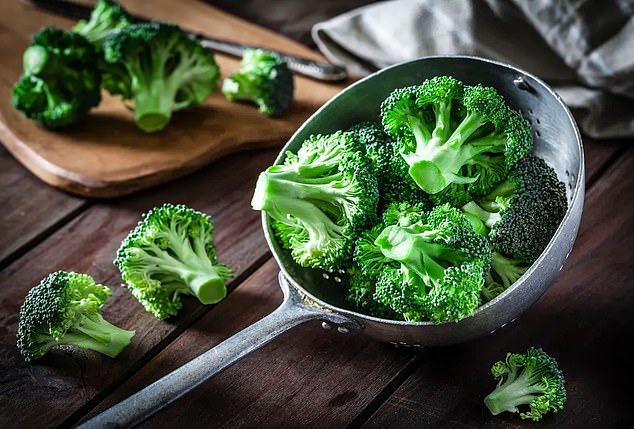
Green leafy vegetables have phytochemicals like chlorophyll, which protect against free radicals that cause aging (stock image)
Vegetables
Dark green vegetables are packed with high levels of vitamin A and C, minerals, fiber, nitrates and bioactives, which help ensure slower cognitive decline and prevent cell damage.
Leafy greens have phytochemicals like chlorophyll, which protects against aging-causing free radicals—and the darker the green, the more chlorophyll it contains.
They also have antioxidants called lutein, which provides hydration and elasticity to protect against sun damage.
Their vitamin A helps strengthen the skin’s protective tissue, while its vitamin C helps provide collagen.
Examples of dark green vegetables include kale, bok choy and chard.
Watercress is rich in vitamins A and C which help neutralize free radicals, causing fine lines and wrinkles to disappear.
Broccoli is full of vitamins C, K and antioxidants, and the vegetable helps produce collagen, which helps make your skin firm and elastic.
Spinach is packed with vitamins A, C, E and K as well as antioxidants. Vitamin A provides you with strong hair for a youthful appearance and vitamin K reduces inflammation in cells.
Green tea is made from the green camellia sinensis plant and reduces brain aging as it protects the skin from sun damage.
Sweet potato’s vibrant orange color comes from its antioxidant beta-carotene, which converts to vitamin A and helps renew skin elasticity and skin cell turnover.
It is also packed with vitamin C and E that protect the skin from free radicals.
Red peppers are high in antioxidants and vitamin C, which helps in collagen production.
Its anti-inflammatory properties also help prevent skin damage from the sun, pollution and the environment.
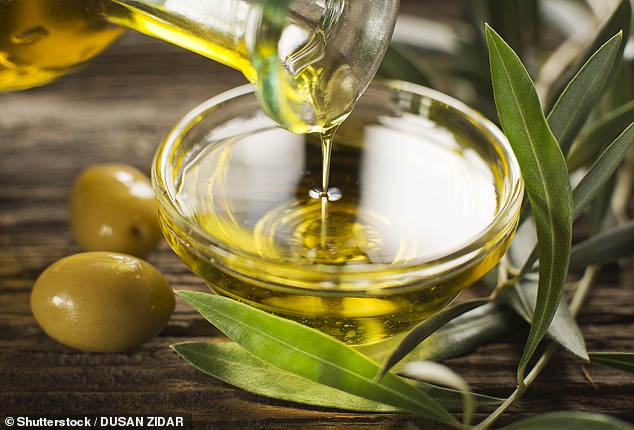
Olive oil helps skin stay hydrated by improving elasticity which prevents fine lines and wrinkles (stock image)
Healthy oils
Plant-based oils contain fatty acids, unsaturated fats and antioxidants.
Coconut oil prevents age spots and extra virgin olive oil specifically contains squalene which increases skin hydration.
Olive oil helps skin stay hydrated by improving elasticity which prevents fine lines and wrinkles.
It is rich in antioxidants that fight free radicals that help with premature aging.
Olive and avocado oil help reduce Alzheimer’s disease and dementia.
Consuming avocado itself helps remove dead skin cells for a glowing appearance thanks to vitamin A.
According to Health line.
Skin enthusiasts can also prevent wrinkles and reduce redness by making a hydrating mask out of it.
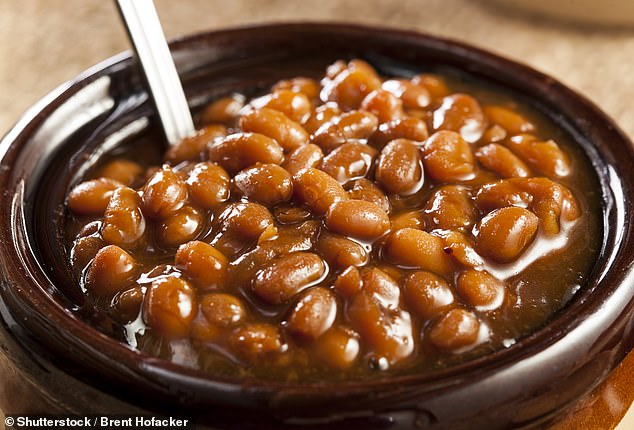
Saponins and phytosterols in legumes help prevent wrinkles (stock image)
Legumes
Legumes contain fiber, protein, minerals, complex carbohydrates, vitamin B and help support cognitive function.
Black beans are packed with antioxidants that help prevent cell damage.
Beans in general also contain anthocyanins and isoflavones which fight premature aging from UV rays and inflammation.
Examples of legumes also include lentils and chickpeas which stimulate the production of collagen that ensures healthy and glowing skin.
The saponins and phytosterols in legumes also help prevent wrinkles.
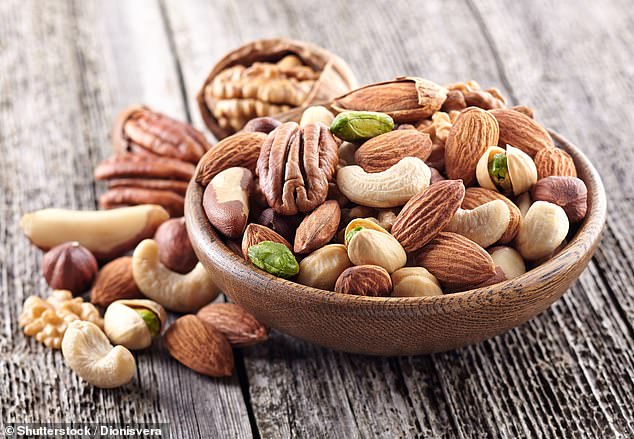
Walnuts have omega-3 fatty acids that strengthen skin cell membranes and protect against sun damage. They contain polyphenols that provide high antioxidants (stock image)
Nuts and seeds
Nuts provide protein, antioxidants, vitamins, minerals and unsaturated fats.
Almonds have vitamin E which protects the skin from UV rays, repairs tissue and helps it stay hydrated preventing wrinkles.
Walnuts have omega-3 fatty acids that strengthen skin cell membranes and protect against sun damage. They contain polyphenols that provide high antioxidants.
Brazil nuts not only have omega-3 fatty acids, but also selenium, which increases skin elasticity.
The glutathione in them helps regenerate your skin and prevent wrinkles.
Walnuts generally help reduce cognitive decline and loss of muscle tissue as a result of aging.
Pomegranate seeds have been used for centuries as a form of natural medicine. They are packed with vitamin C and antioxidants that help reduce inflammation and prevent free radical damage.
The punicalagins in the fruit help maintain collagen in the skin.
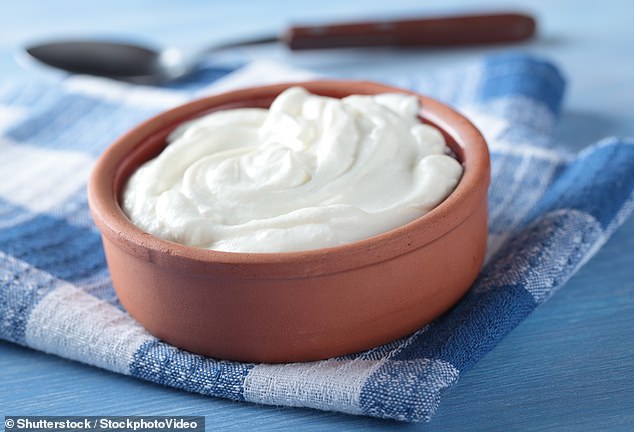
Fermented foods are created through controlled microbial growth and have anti-aging, anti-hypertensive and anti-inflammatory abilities (stock image)
Fermented foods
Fermented foods are created through the controlled growth of microbes.
They have anti-aging, anti-hypertensive, anti-inflammatory, anti-diabetic, anti-cancer and anti-allergenic properties.
Examples include cultured milk and yogurt, wine, miso, sourdough bread, kimchi, sauerkraut, and kombucha.
Miso soup is rich in antioxidants that prevent signs of aging.
Kombucha contains AHA which has amino acids that moisturize the skin. Its vitamin B, C and D increase the firmness of the skin, while its probiotics restore the elasticity of the skin.
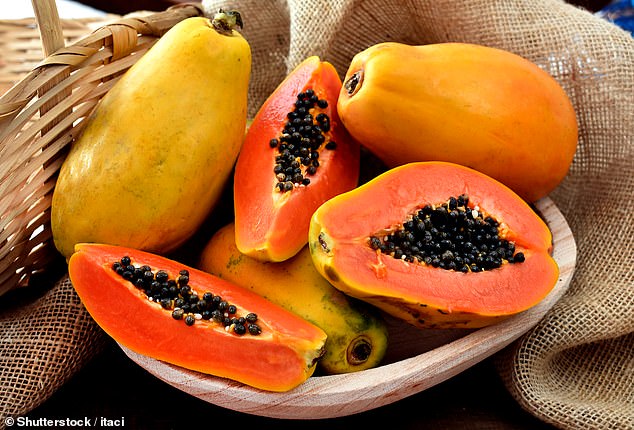
Papaya is a superfood that is full of antioxidants and vitamins A, C, K and E (stock image)
Fruits
Papaya is a superfood that is full of antioxidants and vitamins A, C, K and E.
In addition to its antioxidants that fight free radicals, the fruit contains an enzyme called papain, which has anti-inflammatory agents that help fight aging.
Eating fruit also helps your body remove dead skin cells.
Blueberries are full of vitamins A and C. They also have a specific antioxidant called anthocyanin, which protects the skin from sun, stress and pollution damage by controlling the body’s inflammatory response, which prevents collagen loss.
The fruit also helps reduce vision and cognitive loss due to aging.
Weekend Features Project
